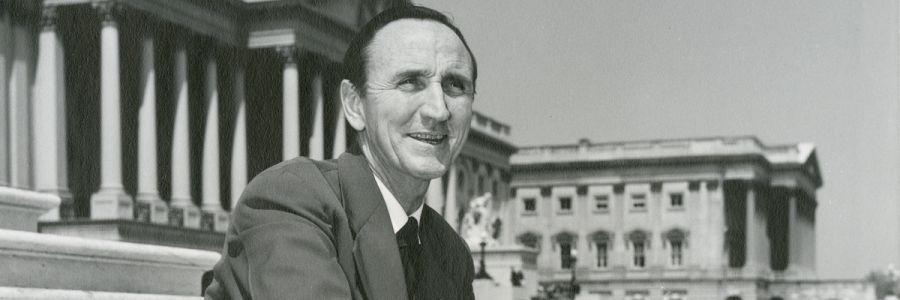
Danielle Allen is a professor of political philosophy, public policy, and ethics at Harvard University. She is Director of the Allen Lab for Democracy Renovation, Director of the Democratic Knowledge Project, and James Bryant Conant University Professor, one of Harvard’s highest honors.
April 18, 2024
By: Carolyn Crowder
Carolyn is a senior undergraduate student at the 91次元 with majors in Political Science and English, and a Communications and Journalism Intern at the Mansfield Center.
“We likely bring a sense of anxiety about our democracy to this lecture tonight,” said Dr. Danielle Allen to a room of UM students, staff, and other community members. The Harvard professor and democracy advocate told the audience, “The question is not whether we can create a healthy democracy, it’s how to do it.”
On March 27, UM hosted its first Democracy Summit, which featured 30 sessions designed to foster dialogue, explore complex issues, and spark innovative ideas on how to build communities rooted in healthy democratic principles. The event culminated with Allen’s lecture “Bringing Democracy Back From The Brink: A Strategic Vision and A Call to Action,” which served as UM’s final President’s Lecture of the semester, co-sponsored by the Mansfield Center.
In her lecture, Allen detailed troublesome shifts in American perspectives of democracy. For example, drawn from the Journal of Democracy shows the proportion of Americans who state it is “essential” to live in a democracy has fallen to 30 percent among millennials from 72 percent among those born before World War II. This, Allen said, signals a dissatisfaction with our institutions and leaders among younger generations.
As a result, Allen calls for a “supermajority for constitutional democracy across ideological lines.” However, to meet this , more than two-thirds of Americans must be “committed to the basic norms and guardrails” of democracy. For Allen, these basic norms entail a commitment to the rule of law, non-violence, full inclusion, and respect for elections.
Allen noted those norms are currently endangered in the U.S., in part due to the prevalence of radical and extremist groups. She identified social media as a particular challenge, which allows small groups to organize quickly and threaten our institutions. She pointed to the January 6 on the U.S. Capitol an example. Another challenge posed by social media, Allen added, is that foreign adversaries can drive division, as shown by a protest and counterprotest in Houston, Texas, by Russian-controlled Facebook groups in 2017. To boost the commitment to democratic norms, Allen believes we need to “welcome back,” or work to deradicalize, extremist views and depolarize our media.
While Allen’s call may seem unattainable in the present polarized climate of U.S. politics, she provided positive examples of cross-ideological agreement in recent state ballot initiatives. Examples include the legalization of recreational or medicinal marijuana, restored voting rights for those with completed felony convictions, and the right to repair in support of small auto shops. For Allen, the key is to extend this spirit of cross-ideological agreement to a national level. To build this, Allen outlined her proposed action steps, inviting individuals to contribute to the protection and renovation of democratic structures.
Her first step to create a healthy democracy is to protect election integrity, noting that “people need to trust the results of our elections.” For example, 39 percent of self-identified Republican adults said in a there was solid evidence proving the results of the 2020 presidential election were not legitimate. Allen encouraged community members to work in to enhance public confidence in fair and accessible elections.
Allen also discussed the importance of healthy local journalism ecosystems. Without strong local journalism, she noted communities may lack the necessary information to make informed decisions and hold local authorities accountable. According to the UNC Hussmann School of Journalism and Media, has three counties without a single newspaper and 35 counties with only one newspaper, reflecting “news desert” regions. In addition, the state experienced a 26 percent decrease in newspaper circulation between 2004 and 2019.
Finally, Allen addressed the need for responsive representation in our democracy, contending “our institutions are not responsive to all of our concerns.” One way to address this, Allen noted, is to end party primaries in favor of nonpartisan primaries for state and federal elections similar to . Allen stated that partisan primaries result in the voting in of candidates by only a small fraction of the electorate. In contrast, Allen contends that nonpartisan parties can alter campaign and governing strategies for candidates as they are compelled to remain accountable to their entire constituency. To remedy this, Allen supports systems, which allow voters to rank candidates in order of preference, eliminating the possibility of a candidate winning with only a minority of votes.
Read more on democracy from Dr. Danielle Allen in her Washington Post .
While the Mansfield Center does not take a position on partisan issues, our work emphasizes the civil exchange of ideas from diverse viewpoints. We hope community members attend our dialogues to share their perspectives and engage in meaningful conversations.
